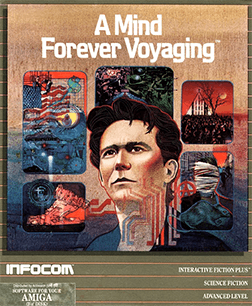A Mind Forever Voyaging

The antechapel where the statue stood of Newton with his prism and silent face, the marble index of a mind for ever Voyaging through strange seas of Thought, alone.—The Prelude, William Wordsworth
A political text-adventure game designed and implemented by Steve Meretzky and published by Infocom in 1985. Really, though, it doesn't really fit the usual preconceptions of the genre... after all, there's only one puzzle and it takes place near the end. Interactive Fiction has applied to few games better than this one, and indeed, was probably the game most influential in the early creation of the term. AMFV is among Infocom's most respected titles, although it was not a commercial success.
It is the year 2031, and the player controls PRISM, the world's first sentient computer. The economy of the United States of North America (USNA) is failing. Great numbers of youths are turning to "Joybooths" (a device which directly stimulates the sensory input of the brain) and committing suicide by over-stimulation. A new arms race involving nuclear weapons no larger than the size of a common pack of cigarettes threatens to turn the USNA into a police state. Unaware that it is a sophisticated computer, PRISM has been living for 11 years (in real-time, 20 years within the simulation) as an ordinary human, "Perry Simm." Dr. Abraham Perelman, PRISM's "father", informs Perry of his true nature and gently brings him from simulation mode into reality. Perelman explains that he has awakened PRISM so a vital mission can be performed: running a simulation of a revitalization plan (dubbed the Plan for Renewed National Purpose), sponsored by Senator Richard Ryder. The plan calls for "renewed national purpose" through de-regulation of government and industry, military conscription, a unilateral approach to diplomatic relations, and a return to traditional and fundamental values. PRISM will enter a simulation of a typical American town at 10 year intervals following the plan's enacting, and observe... for good or for bad.
One of the most blatantly liberal games of all time, and, depending on your personal politics, you'll probably find either it a sustained headache or one of the most effective uses of Some Anvils Need to Be Dropped ever... it especially comes out against hyper-patriotism and the harmful effects of religious fanaticism. The political "solution" offered at the end appears to be one of pacifism and social-welfare statism. However, the fact that its dystopian worlds are ones that you get to explore yourself makes up for a lot. In any case, it is one of the IF game most frequently cited as an inspiration by the current generation of interactive fiction authors, and worth checking out.
As a side note, author Steve Meretzky said he was directly courting controversy with the political content of AMFV. When the game generated nearly no uproar at all, he "decided to write something with a little bit of sex in it, because nothing generates controversy like sex". The resulting game with "a little bit of sex" was Leather Goddesses of Phobos, which indeed got the required controversy Meretzky sought.
- Author Tract: A deconstruction of Reagan-era policies.
- Averted, albeit only slightly, on the trade issue: the game criticized protectionism, which was a policy advocated by labor leaders and others on the American left in the late '80s, when the game was published.
- Also averted, in that neither party has ever advocated a state religion.
- The political plan also called for "vigorous prosecution of tax evasion," which was advocated by Democratic Party Presidential nominee Mike Dukakis in 1988. Also, the calls to strengthen the executive branch and lengthen the presidential term of office weren't specifically right-wing--whichever party holds the presidency has historically favored a strong Presidency.
- Indeed, outside of "tax cuts", virtually nothing the game was soapboxing against actually was a Reagan-era policy. Either the creators were far more ecumenical in their disapproval than it appeared at first glance, or else (and more likely) they Did Not Do the Research.
- Big Brother Is Watching: The later sims.
- Controllable Helplessness: In the less grim simulations, breaking the law results in spending several turns in jail until you're released. In a later, extremely bleak, simulation, you're stuck there until executed. Fortunately, since it's a simulation, getting killed merely returns you to the non-simulation world.
- Corrupt Church: The Church of God's Word
- Engineered Public Confession: In the endgame, Senator Ryder is all too happy to show his True Colors to Dr. Perelman. Your job is to let the world see them as well.
- Everything Trying to Kill You: The 2081 simulation. Described in the official hints as "very deadly", you almost always get killed in within a few turns.
- Feelies
- Inside a Computer System
- Interactive Fiction
- Playable Epilogue: One of the greats.
- Raising Sim: Not in-game, but as a plot-element.
- Strawman Political: Senator Ryder.
- Suicide Is Painless: The ultimate effect of Joy Booths.
- The Great Politics Mess-Up: The USSR is not only still in existence in 2031, it appears to have enjoyed a renaissance. The Soviet Bloc has expanded to include countries such as Greece and Guatemala. Also, South Africa is run by a black-dominated government that oppresses white people.
- Twisted Echo Cut: Prism wakes up this way after the intro to the game. Someone says his "in simulation" name, Perry Simm which, over the course of several slight modifications in text, turns into Prism, said by Dr. Perelman.